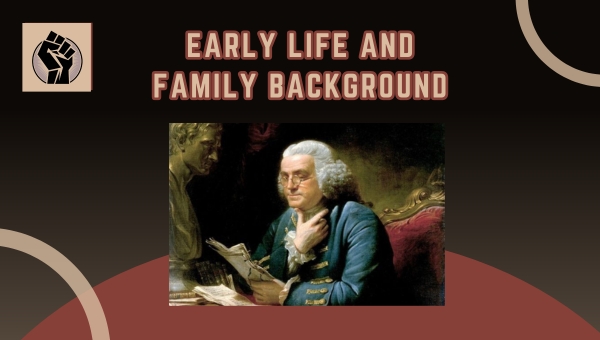Being at the heart of a revolutionary era, where the stakes were high and the world was rapidly changing. William Temple Franklin, a name often overshadowed by his illustrious grandfather, Benjamin Franklin, played a pivotal role during this transformative time. Born into a family of influence and intellect, he was destined for greatness.
His journey from the bustling streets of London to the political arenas of France and America is nothing short of remarkable.
With a knack for diplomacy and politics, William Temple Franklin emerged as a key figure in shaping history. In this article, we delve into his fascinating life, exploring his contributions and enduring legacy.
Early Life and Family Background
William Temple Franklin, born on February 22, 1760, was the illegitimate son of William Franklin and an unknown mother. He was the grandson of the famous American statesman and inventor, Benjamin Franklin.

Raised primarily by his grandfather, William Temple Franklin grew up in a world that was deeply influenced by intellectual pursuits and political ideas.
Benjamin Franklin took an active role in his upbringing, ensuring that he received a well-rounded education and exposure to the political climate of the time. His early life was marked by the blend of British and American influences, which would later shape his diplomatic career.
Education and Career Beginnings Of William Temple Franklin
William Temple Franklin’s education was characterized by a strong emphasis on languages and critical thinking, which were essential for his future endeavors.
Key aspects of his educational background include:
- Early Education: Temple received his initial education in London, where he was exposed to a variety of subjects, including literature and the sciences.
- Language Proficiency: He became fluent in French, a skill that would later facilitate his diplomatic work.
- Influence of Family: Living with his grandfather, Benjamin Franklin, provided him with a unique perspective on political thought and Enlightenment ideals.
Temple’s career began in earnest when he moved to Paris in 1776 to assist Benjamin Franklin as his secretary. This role was pivotal in shaping his professional trajectory, as it allowed him to engage directly in diplomatic efforts during the American Revolution.
Notable points about his early career include:
- Secretary Role: As Franklin’s secretary, he managed correspondence and documentation during crucial negotiations.
- Franco-American Alliance: His contributions were vital in securing the Franco-American Alliance in 1778, strengthening American efforts against British forces.
- Political Insight: Through his work, Temple gained firsthand experience in international relations and the complexities of diplomacy.
These educational and career beginnings set the stage for Temple’s significant yet often overlooked role in early American history.
Also Read: Benjamin Franklin Family: A Legacy of Influence
Role in the American Revolution Of William Temple Franklin
William Temple Franklin played a pivotal role in the American Revolution primarily through his service as secretary to his grandfather, Benjamin Franklin.

His responsibilities included:
- Assisting Diplomatic Efforts: At just 16 years old, Temple joined Benjamin Franklin in Paris, where he aided in negotiations with French officials.
- Facilitating Communication: His fluency in French allowed for effective communication with French diplomats and strengthened Franco-American relations.
- Franco-American Alliance: He was instrumental in securing the Franco-American Alliance on February 6, 1778, which provided essential military support to the American cause.
- Treaty of Paris: Temple continued to serve as his grandfather’s secretary during the Treaty of Paris negotiations (1782-1783), documenting proceedings that recognized American independence.
- Historical Documentation: His meticulous notes and transcriptions from these events have become valuable historical resources.
Contributions to Politics and Diplomacy
William Temple Franklin made several notable contributions to politics and diplomacy during and after the American Revolution, including:
- Secretary to Benjamin Franklin: He served as a secretary to his grandfather, assisting in critical diplomatic negotiations in France, which were vital for American independence.
- Franco-American Alliance: Temple played a key role in securing the Franco-American Alliance in 1778, which provided essential military support to the American forces.
- Treaty of Paris: He was involved in the negotiations for the Treaty of Paris (1782-1783), which formally ended the Revolutionary War and recognized American independence.
- Political Aspirations: After returning to America, he sought a political career but faced challenges due to his family’s Loyalist ties, limiting his influence in post-Revolutionary politics.
- American Philosophical Society: In 1786, he became a member of this prestigious society, contributing to intellectual discussions and promoting scientific advancements.
These contributions underscore Temple’s significant yet often underappreciated role in shaping early American diplomacy.
Later Life and Legacy
As William Temple Franklin aged, his life took on a reflective tone, marked by both personal achievements and contributions to history. His later years were spent nurturing the diplomatic and political relationships he had forged throughout his career.
Franklin’s legacy is deeply intertwined with his family’s history and the early years of the United States, leaving a lasting mark that continues to be studied and appreciated.
Lasting Influence
William Temple Franklin’s later life was characterized by a commitment to preserving the legacy of his grandfather, Benjamin Franklin. He meticulously compiled and edited Benjamin’s papers, ensuring their publication for future generations.
This work was crucial in documenting the history of one of America’s founding figures. Franklin’s own achievements include his diplomatic service and his efforts in the American Revolution, which have been recognized for their significance.
His dedication to documenting and preserving history has made his influence enduring, offering valuable insights into the early years of the United States. Through his work, Franklin has provided a window into the past, making history accessible and informative for all.
How Did Temple Franklin Die?
William Temple Franklin passed away on May 25, 1823, in Paris, at the age of approximately 63. The circumstances surrounding his death remain somewhat unclear, with no definitive cause recorded.
Key points regarding his passing include:
- Health Decline: In the years leading up to his death, Temple experienced various health issues, which may have contributed to his declining condition.
- Financial Struggles: His later life was marked by financial difficulties, which could have exacerbated any health problems he faced.
- Final Years: Despite his earlier contributions to diplomacy and literature, Temple’s final years were characterized by a lack of stability and support.
- Burial: He was laid to rest in Paris, though the exact location of his grave has since been lost to history.
Temple Franklin’s legacy is often overshadowed by that of his grandfather, Benjamin Franklin, yet his role in American diplomacy during the Revolutionary War remains significant.
Also Read: Benjamin Franklin’s Inventions [Revolutionary Discoveries]
Why William Temple Franklin Is So Famous?
William Temple Franklin is notable for several key contributions that intertwine with American history, particularly during the Revolutionary War:
- Grandson of Benjamin Franklin: As the illegitimate grandson of the renowned Founding Father, Temple was deeply connected to significant historical events, serving as a bridge between his grandfather’s legacy and the new nation.
- Role as Secretary: He served as Benjamin Franklin’s secretary during crucial diplomatic missions in France from 1776 to 1785, assisting in negotiations that secured the Franco-American Alliance in 1778.
- Franco-American Relations: His fluency in French and understanding of European customs helped strengthen ties between America and France, which were vital for American success in the Revolution.
- Historical Documentation: Temple meticulously documented events during the Treaty of Paris negotiations (1782-1783), providing valuable historical records that contribute to our understanding of this pivotal moment.
- Cultural Influence: After the war, he remained in Europe, becoming a prominent figure in Parisian intellectual circles, promoting American ideals and contributing to scientific discourse.
These factors collectively highlight Temple Franklin’s unique position and influence during a transformative period in American history.
FAQs
How was William Temple Franklin related to Benjamin Franklin?
William Temple Franklin was the grandson of Benjamin Franklin. He worked closely with his grandfather, particularly during diplomatic missions in France, showcasing a strong collaborative relationship.
What contributions did William Temple Franklin make to politics and diplomacy?
William Temple Franklin significantly contributed to politics and diplomacy by aiding in negotiations and fostering alliances with France during the American Revolution, helping to secure support for the American colonies.
What was William Temple Franklin’s cause of death?
William Temple Franklin passed away in 1823. His cause of death was not extensively documented, but he is remembered for his influential role in diplomacy and his contributions to American history.
Conclusion
William Temple Franklin played a significant role in the history of the American Revolution and early American diplomacy. His work, particularly in France, showcased his ability to navigate complex political landscapes.
Through his collaboration with Benjamin Franklin, he contributed to the successful negotiation of alliances that were crucial for the American cause. His legacy endures, highlighting the importance of diplomacy and political strategy in shaping history. Understanding his life gives us insight into the foundational years of American diplomacy.
If you found this exploration of William Temple Franklin fascinating, I encourage you to delve into more historical insights on our site.





